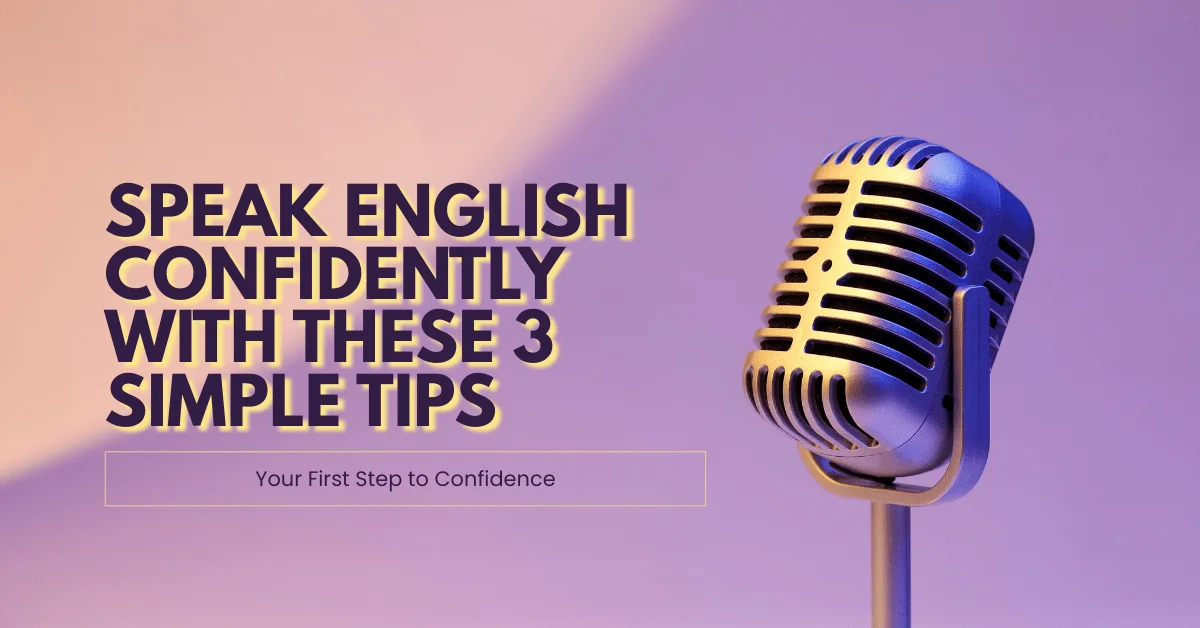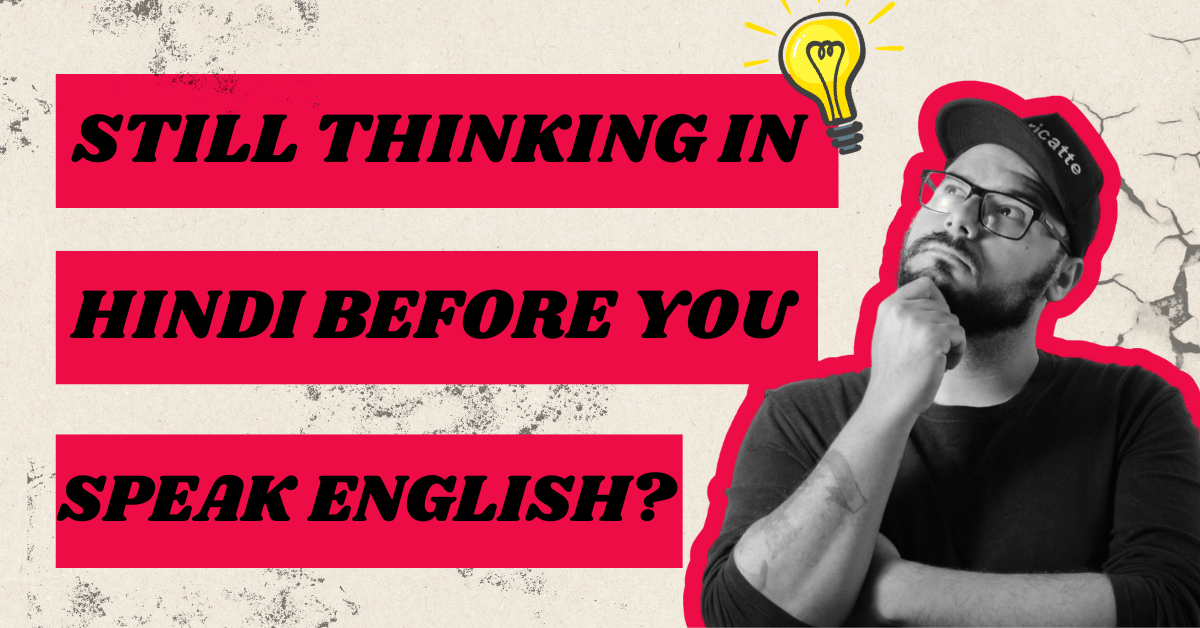Speaking English confidently is not about using advanced vocabulary or speaking perfect grammar.
It’s about feeling comfortable expressing your thoughts — even when your sentences aren’t perfect.
Many learners understand English well, yet hesitate while speaking.
The problem is rarely knowledge.
The problem is lack of real speaking practice.
In real conversations with English learners, one pattern appears again and again — people know what they want to say, but freeze the moment they start speaking. This hesitation isn’t caused by weak grammar but by a lack of regular, judgment-free speaking practice.
If you want to speak English confidently in daily life, interviews, meetings, or social situations, these three simple tips can change the way you approach English forever.
Why Speaking English Confidently Feels Difficult
Before fixing the problem, it’s important to understand it.
Most learners struggle because:
- They translate sentences in their head
- They fear making mistakes
- They don’t get regular speaking opportunities
Confidence doesn’t come from reading or watching videos alone.
When learners only consume English instead of using it, their brain stays in “understanding mode,” not “response mode.” Speaking requires fast thinking under pressure — something that only develops through real conversation.
It comes from using English regularly in real conversations.
Let’s look at what actually works.
Tip 1: Stop Preparing Sentences. Start Expressing Thoughts.
One of the biggest mistakes learners make is over-preparation.
They try to:
- Memorise full sentences
- Plan responses in advance
- Wait for the “right moment” to speak
But real conversations don’t work like exams.
Learners who over-prepare sentences often pause mid-conversation, lose confidence, and abandon their point halfway. Those who allow themselves to speak imperfectly tend to recover faster and communicate more clearly.
To speak English confidently, you must learn to think while speaking, not before speaking.
What to Do Instead
Start expressing simple thoughts out loud — even if they sound incomplete.
For example:
- Talk about what you are doing right now
- Describe your day in simple English
- Speak without stopping yourself for mistakes
Fluency grows when your mind learns that speaking is safe, even when it’s imperfect.
Tip 2: Make Mistakes in a Safe Environment
Mistakes are not the problem. Fear of judgement is.
Many learners stop speaking because:
- People laugh
- Corrections feel harsh
- They feel embarrassed
This fear is natural — especially for adult learners. Confidence drops not because of mistakes, but because of repeated negative speaking experiences.
To speak English confidently, you need:
- A patient listener
- Supportive correction
- Encouragement, not pressure
This is why practicing alone is not enough.
You need real human interaction with someone who helps you improve while you speak.
Tip 3: Practice English Daily, Not Occasionally
Confidence is not built in one day.
It is built through daily exposure.
Many learners wait for:
- Free weekends
- Long study hours
- Motivation
But confidence grows faster with:
- 10–15 minutes every day
- Short, consistent speaking sessions
- Regular feedback
Daily practice trains your brain to stop panicking and start responding naturally. Even short daily speaking sessions reduce hesitation within weeks because the brain stops treating English as a “performance” and starts treating it as a normal communication tool.
While you’re at it, make sure you’re also confident with small but essential elements like “a,” “an,” and “the.” These articles may seem simple, but they affect how professional and polished your English sounds.
Here’s a quick guide to brush up on them: Articles in English Grammar – A, An and The
How the EngVarta App Helps You Speak English Confidently
EngVarta was created for learners who understand English but struggle to use it in real conversations — a gap noticed repeatedly during live speaking interactions.
Knowing what to do is one thing.
Doing it daily is another.
This is where EngVarta helps learners bridge the gap between knowing English and speaking it confidently.
What Makes EngVarta App Effective
- One-on-One Live English Conversations
Speak directly with trained English experts. - Friendly, Real-Time Corrections
Improve naturally without interruptions or embarrassment. - Daily Speaking Habit
Short sessions designed for busy schedules. - Confidence-Focused Learning
The goal is fluency through comfort, not fear.
EngVarta is designed for learners who already know English but struggle to use it confidently in real life.
Who Is This For?
Beginners
If English feels intimidating, EngVarta helps you start speaking gently, without pressure.
Practicing Learners
If you understand English but hesitate while speaking, real conversations help unlock fluency.
Serious Learners
If you want faster improvement for interviews, work communication, or daily confidence, consistent speaking practice makes the difference.
Start Speaking English Confidently Today
Confidence doesn’t come first.
Speaking comes first.
🔗 Download EngVarta:
Download for Android | Download for iOS
Practice real conversations.
Speak daily.
Build confidence naturally.
Stay Connected With EngVarta
Follow EngVarta for daily English tips, speaking guidance, and confidence-building content:
- Instagram: https://www.instagram.com/engvarta.app
- YouTube: https://www.youtube.com/@Engvarta
- Facebook: https://www.facebook.com/engvarta
This article is based on real speaking interactions and learning patterns observed while helping English learners practice spoken English daily.
Final Note
Speaking English confidently is not about becoming perfect.
It’s about becoming comfortable.
And comfort only comes from practice.
Frequently Asked Questions (FAQs)
-
Who should use the EngVarta app?
EngVarta is ideal for students, working professionals, and anyone who understands English but struggles to speak confidently in real-life situations.
-
How does the EngVarta app help improve speaking confidence?
EngVarta provides one-on-one live conversations with trained English experts who offer friendly corrections, helping learners speak freely without fear or judgement.
-
Is speaking practice more important than reading and watching videos?
Yes. Reading and videos help with understanding, but speaking practice trains your brain to respond in real time, which is essential for confidence.
-
Do I need perfect grammar to speak English confidently?
No. Many confident speakers make small grammar mistakes. When you speak regularly, your grammar improves naturally over time through usage and feedback.
-
How can I speak English confidently without hesitation?
You can speak English confidently by practicing daily in real conversations. Focus on expressing your thoughts instead of worrying about mistakes. Confidence builds through repetition, not perfection.




